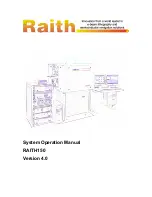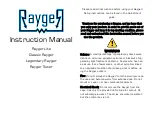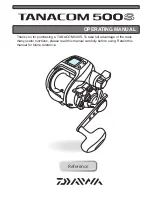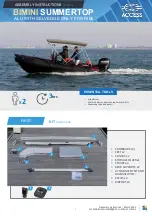
Gründliches Ab- bzw. Ausspülen der gesamten Oberfläche, insbesondere der Aushöhlungen, Spalten und Bohrungen,
unter fließendem Wasser (Trinkwasser, 30 °C ± 3 °C) zur Entfernung der Desinfektionslösungs reste. Bewegliche Teile
müssen dabei bewegt werden.
Spülen mit demineralisiertem Wasser für mindestens 5 Sekunden pro Teil.
5.3 Sterilisation
Die Sterilisation erfolgt im zusammengebauten, entlasteten Zustand, wobei nur sorgfältig gereinigte und desinfizierte Teile
ohne jegliche Korrosionserscheinung zusammengebaut und sterilisiert werden dürfen. Es wird empfohlen, die Sterilisation
mit einem Vakuumautoklaven durchzuführen. Hierzu das tomas
®
-handpiece mit geeigneten Sterilisationstüten verpacken
und mit 3x fraktionierten Vorvakuum für 5 Minuten bei 134 °C sterilisieren. Trocknungszeit 20 Minuten.
5.4 Lagerung
Die Lagerung erfolgt bei Raumtemperatur in einem trockenen Umfeld.
6. Gewährleistung
Die Verantwortung für die sachgerechte Reinigung und Desinfektion liegt beim Betreiber / Produktanwender.
Nationale Regelungen, auch Einschränkungen hierzu, müssen unbedingt beachtet werden.
Dentaurum liefert ausschließlich geprüfte und fehlerfreie Produkte an Ihre Kunden aus. Alle unsere Produkte sind so
ausgelegt und gefertigt, dass sie höchsten Qualitätsansprüchen genügen. Dentaurum als Hersteller der Produkte schließt
jegliche Gewährleistungsansprüche aus und übernimmt keine Haftung für unmittelbare Schäden oder Folgeschäden,
welche entstehen durch:
zweckentfremdete Verwendung
unsachgemäße Verwendung, Anwendung oder Handhabung
unsachgemäße Aufbereitung
unsachgemäße Wartung und Reparatur
Nichtbeachten der Gebrauchsinformationen
7. Lieferprogramm
tomas
®
-handpiece, 1 Stück
REF
302-004-80
8. Qualitätshinweise
Dentaurum versichert dem Anwender eine einwandfreie Qualität der Produkte. Der Inhalt dieser Gebrauchsan weisung
beruht auf eigener Erfahrung. Der Anwender ist für die Verarbeitung der Produkte selbst verantwortlich. In Ermangelung
einer Einflussnahme von Dentaurum auf die Verarbeitung besteht keine Haftung für fehlerhafte Ergebnisse.
9. Erklärung der verwendeten Etikettensymbole
Bitte Etikett beachten. Zusätzliche Hinweise finden Sie im Internet unter www.dentaurum.com
(Erklärung der Etikettensymbole REF 989-313-00).
Stand der Information: 02/17
Änderungen vorbehalten
EN
tomas
®
-handpiece
(Manually turned unit with adjustable torque)
Dear customer,
Thank you for choosing a quality product from Dentaurum.
In order to achieve the best results with this product, it is important to carefully study and follow these Instructions for use.
Instructions for use cannot describe every eventuality and possible application. In case of questions or ideas, please contact
your local representative.
As our products are regularly upgraded, we recommend that you always carefully read the current Instructions for use
supplied with the product and stored in the internet at www.dentaurum.com, even though you may frequently use the
same product.
1. Manufacturer
Dentaurum GmbH & Co. KG I Turnstr. 31 I 75228 Ispringen I Germany
2. General product description
Manually turned unit modified to Pauls, with adjustable torque from 0 – 40 Ncm.
The tomas
®
-handpiece is not sterilized on delivery and must be cleaned, disinfected and sterilized prior to each use,
including initial use.
The tomas
®
-handpiece can be used with standard contra-angled handpieces (blue 1:1). Click the tomas
®
-handpiece
into the contra-angled handpiece.
To insert tomas
®
-pin:
Turn right (clockwise).
To remove tomas
®
-pin:
turn left (anti-clockwise).
3. Using the tomas
®
-handpiece
The tomas
®
-handpiece with torque control consists of a handle with coupling (Fig. 1a) and an adjusting screw (Fig. 1b).
3.1 Setting the torque function
The torque set is reached when the respective marking ring of the adjusting screw on the end of the handle is just visible
(Fig. 2). When loaded, the coupling releases once the set torque is reached. Do not turn any further, as otherwise there is
the risk of exceeding the torque.
When the tomas
®
-handpiece is not in use, the adjusting screw should be turned back until the
spring is fully released.
4. Maintenance of the tomas
®
-handpiece
4.1 Disassembly
Fully unscrew the adjusting screw (Fig. 3f) from the handle with coupling (Fig. 3a).
Pull the handle (Fig. 3a) and the adjusting screw (Fig. 3f) apart and remove the spring (Fig. 3d) and the two internal
shafts (Fig. 3b + c).
4.2 Assembly
All elements should be cleaned, disinfected and completely dry before assembly. Lubricate the internal
shafts (Fig. 3b + c), and the spring (Fig. 3d). This reduces the metal-to-metal friction and prevents frictional corrosion.
Only instrument oil (e.g. paraffin-based oil spray) with approval for steam sterilization and tested biocompatibility
should be used.
Place the spring (Fig. 3d) onto the internal shaft (Fig. 3c).
Insert the internal shafts (Fig. 3b + c) and the spring (Fig. 3d) into the handle (Fig. 3a).
Wind the adjusting screw (Fig. 3f) into the handle (Fig. 3a) until the resistance of the spring is felt.
Before sterilization, the tomas
®
-handpiece should be checked for correct function in both directions.
5. General precautions
5.1 Preparation
Place the tomas
®
-handpiece in a cleaning/disinfection agent immediately after use. This is for personal safety and prevents
contamination from drying. The cleaning and disinfection agent used during this stage is for your personal protection only
and cannot replace the disinfection stage to be completed later after cleaning.
The cleaning agent manufacturer‘s instructions regarding concentration, immersion time and temperature should be strictly
observed.
5.2 Cleaning and disinfection
The tomas
®
-handpiece must be disassembled for cleaning and disinfection (see 4.1). Cleaning and disinfection can be
performed automatically with the aid of a thermodisinfector (adhere to the manufacturer‘s instruction) or manually using
suitable cleaning and disinfection solutions.
Use of an enzymatic cleaning agent with an almost neutral pH value is recommended. Do not use cleaning and disinfection
agents that contain halogens (chlorine, iodine, bromine, fluorine), oxidation agents (H
2
O
2
), organic solvents, heavy metal
salts, aldehydes or aromatic/halogenated hydrocarbons.
The manufacturer’s instructions should be observed when using an ultrasonic cleaner for disinfection and cleaning.
The following stages are recommended when performing the automatic cleaning / disinfection process
in a thermodisinfector:
Cleaning
Rinse for 1 minute with cold water
Clean for 5 minutes using a suitable cleaning agent at 55 °C ± 2 °C / 131 °F ± 2 °F (e. g. neodisher
®
MediClean, 0.5 %)
Neutralise for 2 minutes in cold water
Rinse for 1 minute with cold water
Disinfection
5 minutes thermal disinfection at 93 °C (199.4 °F) using demineralized water
The following stages are recommended when performing the manual cleaning / disinfection process:
Cleaning
Mechanical cleaning of the entire surface, particularly of the hollow sections, gaps and drill holes under running water
(drinking water, 30 °C ± 3 °C / 86 °F ± 3 °F) with the aid of a soft brush until all residue has been removed (20 seconds
minimum per component). Never use metal brushes, abrasive cleaners, steel wool or apply excessive force).
Clean for 5 minutes in an ultrasonic cleaner (minimum frequency: 35 kHz) using a suitable cleaning solution (e. g. 2 %
MediClean
®
, Dr. Weigert, in drinking water).
Rinse the entire surface, particularly hollow sections, gaps and drill holes under running water (drinking water, 30 °C
± 3 °C / 86 °F ± 3 °F) for a minimum of 10 seconds per component. Moveable parts must be moved when rinsing.
Rinse with demineralized water for a minimum of 5 seconds per component.
Disinfection
Immerse the components for 30 minutes in disinfectant solution (e. g. 2 % neodisher
®
SeptoMED, Dr. Weigert, in
drinking water at 20 °C ± 2 °C / 68 °F ± 2 °F) and move the components in the solution to remove air bubbles
on the surface.
Immerse for 1 minute in cold, demineralized water.
Thoroughly rinse the entire surface, particularly hollow sections, gaps and drill holes under running water (drinking
water, 30 ± 3 °C / 86 °F ± 3 °F) to remove the disinfectant solution residue. Moveable parts must be moved when
rinsing.
Rinse with demineralized water for a minimum of 5 seconds per component.
5.3 Sterilization
The ratchet should be sterilized assembled and unloaded, whereby only thoroughly cleaned and disinfected components
without any signs of corrosion may be assembled and sterilized. It is recommended to complete the sterilization using a
vacuum autoclave. Pack the tomas
®
-handpiece in suitable sterilization bags and sterilize using 3x fractional prevacuum for
5 minutes at 134 °C (273,2 °F). Drying time is 20 minutes.
5.4 Storage
Store in a dry environment at room temperature.
6. Warranty
The operator/product user is responsible for the correct cleaning and disinfection of the product. National
regulations and restrictions must be adhered to.
Dentaurum delivers only examined, fault-free products to customers. All of our products are designed and manufactured
to satisfy the highest demands on quality. Dentaurum excludes all warranty claims and accepts no liability for immediate
or consequential damages caused by:
misuse
improper use, application or handling
improper preparation
improper maintenance and repair
non-observance of information regarding use
7. Availability
tomas
®
-handpiece, 1 piece
REF
302-004-80
8. Quality information
Dentaurum ensures a faultless quality of the products manufactured by us. These recommendations are based upon
Dentaurum´s own experiences. The user is responsible for the processing of the products. Responsibility for failures cannot
be taken, as we have no influence on the processing on site.
9. Explanation of symbols used on the label
Please refer to the label. Additional information can be found at www.dentaurum.com (Explanation of symbols
REF 989-313-00).
Date of information: 02/17
Subject to modifications
FR
tomas
®
-handpiece
(Manche de vissage manuel avec ajustage du couple)
Chère Cliente, cher Client,
Nous vous remercions d‘avoir choisi un produit de la qualité Dentaurum.
Pour une utilisation sûre et pour que vous et vos patients puissiez profiter pleinement des divers champs d‘utilisation
que couvre ce produit, nous vous conseillons de lire très attentivement son mode d‘emploi et d‘en respecter toutes les
instructions.
Un mode d‘emploi ne peut décrire de manière exhaustive tous les aspects liés à l‘utilisation d‘un produit. Si vous avez des
questions, votre représentant sur place est à votre service pour y répondre et prendre note de vos suggestions.
En raison du développement constant de nos produits, nous vous recommandons, malgré l‘utilisation fréquente du même
produit, la relecture attentive du mode d‘emploi actualisé ci joint (cf. également sur Internet sous www.dentaurum.com).
1. Fabricant
Dentaurum GmbH & Co. KG I Turnstr. 31 I 75228 Ispringen I Allemagne
2. Description générale du produit
Manche de vissage manuel, modèle Pauls, avec ajustage du couple de 0 à 40 Ncm.
Le tomas
®
-handpiece est livré non stérile et doit être nettoyé, désinfecté et stérilisé avant la première utilisation et
avant toute autre utilisation.
Le tomas
®
-handpiece est utilisable avec les pièces à main à contre-angle usuelles (bleu 1:1). Placez le
tomas
®
-handpiece sur la pièce à main à contre-angle jusqu‘à ce qu‘il s‘y enclenche.
Vissage :
sens de rotation vers la droite (sens horaire).
Dévissage : sens de rotation vers la gauche (sens antihoraire).
3. Utilisation du tomas
®
-handpiece
Le tomas
®
-handpiece avec ajustage du couple est composé d‘un manche avec coupleur (fig. 1a) et d‘une vis de réglage
(fig. 1b).
3.1 Réglage de la fonction du couple
Le couple à régler est atteint lorsque l‘anneau de marquage de la vis de réglage est tout juste visible à l‘extrémité de la
poignée. Sous l‘effet d‘une charge, le coupleur continue de cliquer lorsque le couple réglé a été atteint. Après cette phase,
ne tournez plus, sinon le couple risque d‘être largement dépassé.
Si vous n‘utilisez pas le tomas
®
-handpiece, desserrez la vis de réglage jusqu‘à ce que le ressort soit
libéré complètement de toute pression.
4. Maintenance du tomas
®
-handpiece
4.1 Démontage
Dévissez complètement la vis de réglage (fig. 3f) du manche avec coupleur (fig. 3a).
Otez le manche (fig. 3a) de la vis de réglage (fig. 3f) et prélevez le ressort (fig. 3d) ainsi que les deux pièces
d‘accouplement (fig. 3b + c).
4.2 Montage
Avant le montage, toutes les pièces doivent avoir été nettoyées et désinfectées et être absolument sèches. Graissez les pièces
d‘accouplement (fig. 3b + c) et le ressort (fig. 3d). Ceci permet de réduire le frottement du métal contre le métal et
d‘éviter la corrosion par frottement. N‘utilisez que des huiles pour instruments (p. ex. spray d‘huile à base de paraffine)
homologuées pour la stérilisation à la vapeur et dont la biocompatibilité a été démontrée.
Glissez le ressort (fig. 3d) par-dessus la pièce d‘accouplement (fig. 3c).
Insérez les pièces d‘accouplement (fig. 3b + c) et le ressort (fig. 3d) dans le manche (fig. 3a).
Vissez la vis de réglage (fig. 3f) dans le manche (fig. 3a) jusqu‘à ce que la résistance du ressort soit perceptible.
Avant la stérilisation, il faut effectuer un test de fonctionnement des tomas
®
-handpiece dans les
deux sens.
5. Préparation générale
5.1 Conditionnement
Déposez le tomas
®
-handpiece dans une solution nettoyante / désinfectante immédiatement après usage. Ceci pour
votre propre sécurité et pour éviter que les impuretés ne s‘assèchent. Le produit nettoyant et désinfectant utilisé lors du
conditionnement sert uniquement à votre protection et ne peut remplacer l‘étape ultérieure de désinfection à réaliser après
le nettoyage. Respectez scrupuleusement les instructions du fabricant du produit de nettoyage portant sur la concentration,
le délai d‘action et la température.
5.2 Nettoyage et désinfection
Démontez le tomas
®
-handpiece avant d‘effectuer le nettoyage et la désinfection (voir point 4.1). Le nettoyage et la
désinfection se font automatiquement à l‘aide d‘un appareil de désinfection thermique (respectez le mode d‘emploi du
fabricant) ou à la main avec des solutions nettoyantes et désinfectantes appropriées.
Il est recommandé d‘utiliser un produit de nettoyage enzymatique au pH quasiment neutre. N‘utilisez pas des produits
nettoyants et désinfectants contenant des halogènes, (chlore, iode, brome, fluor), des agents oxydants (H2O2), des solvants
organiques, des sels de métaux lourds, des aldéhydes ou des hydrocarbures aromatiques ou halogénés.
Si vous utilisez un appareil à ultrasons pour le nettoyage et la désinfection, respectez le mode d‘emploi du
fabricant.
Etapes recommandées lors du nettoyage / la désinfection automatique dans un appareil de désinfection
thermique :
Nettoyage
Rincez pendant 1 minute à l‘eau froide.
Nettoyez pendant 5 minutes avec un produit de nettoyage approprié à 55 °C ± 2 °C (p. ex. neodisher
®
MediClean, 0,5 %).
Neutralisez pendant 2 minutes à l‘eau froide.
Rincez pendant 1 minute à l‘eau froide.
Désinfection
Désinfection thermique à 93 °C pendant 5 minutes à l‘eau déminéralisée.
Etapes recommandées lors du nettoyage / de la désinfection manuel(le) :
Nettoyage
Nettoyez mécaniquement toute la surface, notamment les cavités, fentes et perforations à l‘eau courante (eau potable,
30 °C ± 3 °C) à l‘aide d‘une brosse douce jusqu‘à élimination complète de tous les résidus (au moins vingt secondes
par pièce). N‘utilisez jamais de brosses métalliques, produits à récurer, laines d‘acier et ne brossez pas de manière trop
énergique.
Nettoyez pendant 5 minutes dans un bain à ultrasons (fréquence minimale : 35 kHz) à l‘aide d‘une solution de
nettoyage appropriée (p. ex. 2 % MediClean
®
, Dr. Weigert, dans de l‘eau potable).
Rincez toute la surface, notamment les cavités, fentes et perforations à l‘eau courante (eau potable, 30 °C ± 3 °C)
pendant au moins 10 secondes par pièce. Il faut remuer les pièces mobiles lors de cette opération.
Rincez chaque pièce à l‘eau déminéralisée pendant au moins 5 secondes.
Désinfection
Immergez les pièces pendant 30 minutes dans une solution désinfectante (p. ex. 2 % neodisher
®
SeptoMED, Dr. Weigert,
dans de l‘eau potable à 20 °C ± 2 °C) et remuez-les dans la solution afin d‘éliminer les bulles d‘air à la surface.
Immergez pendant 1 minute dans de l‘eau déminéralisée froide.
Rincez minutieusement toute la surface, notamment les cavités, fentes et perforations à l‘eau courante (eau potable,
30 °C ± 3 °C) afin d‘éliminer toute trace de solution désinfectante. Il faut remuer les pièces mobiles lors de cette
opération.
Rincez chaque pièce à l‘eau déminéralisée pendant au moins 5 secondes.
5.3 Stérilisation
La stérilisation a lieu lorsque les pièces sont assemblées et ne sont soumises à aucune charge. N‘assemblez et ne stérilisez
que des pièces minutieusement nettoyées et ne présentant aucune trace de corrosion. Il est recommandé d‘effectuer la
stérilisation dans un autoclave à vide. A cet effet, emballez le tomas
®
-handpiece dans des sacs de stérilisation appropriés
et stérilisez-le avec pré-vide fractionné (3 fois) pendant 5 minutes à 134 °C. Temps de séchage : 20 minutes.
5.4 Stockage
Le stockage se fait à température ambiante, dans un endroit sec.
6. Garantie
L‘opérateur/l‘utilisateur du produit doit s‘assurer que le nettoyage et la désinfection sont pratiqués dans les
règles de l‘art. Respectez impérativement les dispositions nationales ainsi que les restrictions en la matière.
Dentaurum ne livre que des produits testés et exempts de défauts à ses clients. Tous nos produits ont été conçus et fabriqués
dans le souci de satisfaire aux exigences de qualité les plus pointues. En tant que fabricant de produits, Dentaurum exclut
tout droit de garantie et décline toute responsabilité en cas de dommages directs ou indirects résultant :
d‘un mésusage
d‘une utilisation inappropriée, mauvaise manipulation
DE
tomas
®
-handpiece
(Manueller Drehansatz mit einstellbarem Drehmoment)
Sehr geehrte Kundin, sehr geehrter Kunde
Vielen Dank, dass Sie sich für ein Qualitätsprodukt aus dem Hause Dentaurum entschieden haben.
Damit Sie dieses Produkt sicher und einfach zum größtmöglichen Nutzen für sich und die Patienten einsetzen können,
muss diese Gebrauchs an wei sung sorgfältig gelesen und beachtet werden.
In einer Gebrauchsanweisung können nicht alle Gegebenheiten einer möglichen Anwendung beschrieben werden.
Bei Fragen und Anregungen können Sie sich gerne an unsere Hotline (+49 7231 / 803-550) wenden.
Aufgrund der ständigen Weiterentwicklung unserer Produkte empfehlen wir Ihnen auch bei häufiger Verwendung des
gleichen Produktes immer wieder das aufmerksame Durchlesen der jeweils aktuell beiliegenden bzw. im Internet unter
www.dentaurum.com hinterlegten Gebrauchsanweisung.
1. Hersteller
Dentaurum GmbH & Co. KG I Turnstr. 31 I 75228 Ispringen I Deutschland
2. Allgemeine Produktbeschreibung
Manueller Drehansatz mod. nach Pauls, mit einstellbarem Drehmoment von 0 – 40 Ncm.
Das tomas
®
-handpiece wird unsteril ausgeliefert und muss vor der Erstanwendung und vor jeder weiteren Anwendung
gereinigt, desinfiziert und sterilisiert werden.
Das tomas
®
-handpiece kann mit handelsüblichen Winkelhandstücken (blau 1:1) verwendet werden. Das
tomas
®
-handpiece bis zum Einrasten auf das Winkelhandstück aufsetzen.
Eindrehen: Drehrichtung nach rechts (Uhrzeigersinn).
Ausdrehen: Drehrichtung nach links (Gegenuhrzeigersinn).
3. Anwendung des tomas
®
-handpiece
Das tomas
®
-handpiece mit Drehmomenteinstellung besteht aus einem Handgriff mit Kupplung (Fig. 1a) und einer
Einstellschraube (Fig. 1b).
3.1 Einstellen der Drehmomentfunktion
Das einzustellende Drehmoment ist erreicht, wenn der entsprechende Markierungsring der Einstellschraube am Griffende
gerade noch sichtbar ist (Fig. 2). Unter Belastung klickt die Kupplung beim Erreichen des eingestellten Drehmoments weiter.
Danach auf keinen Fall weiterdrehen, da sonst Gefahr besteht, das Drehmoment deutlich zu überschreiten.
Bei Nichtbenutzung des tomas
®
-handpiece ist die Einstellschraube soweit zurückzudrehen, bis die
Feder ganz entlastet ist.
4. Wartung des tomas
®
-handpiece
4.1 Demontage
Einstellschraube (Fig. 3f) komplett vom Handgriff mit Kupplung (Fig. 3a) abschrauben.
Handgriff (Fig. 3a) von der Einstellschraube (Fig. 3f) abziehen und die Feder (Fig. 3d) und die beiden Mitnehmer
(Fig. 3b + c) entnehmen.
4.2 Montage
Vor der Montage müssen alle Elemente desinfiziert, gereinigt und absolut trocken sein. Ölen Sie die Teile
Mitnehmer (Fig. 3b + c) und Feder (Fig. 3d). Hierdurch wird die Reibung von Metall auf Metall reduziert und Reibkorrosion
vermieden. Es sollten nur Instrumentenöle (z. B. Öl-Spray auf Parafin-Basis) mit Zulassung für Dampfsterilisation und
getesteter Biokompatibilität verwendet werden.
Feder (Fig. 3d) über den Mitnehmer (Fig. 3c) schieben.
Mitnehmer (Fig. 3b + c) und Feder (Fig. 3d) in Handgriff (Fig. 3a) einlegen.
Einstellschraube (Fig. 3f) soweit in den Handgriff (Fig. 3a) eindrehen, bis der Widerstand der Feder spürbar wird.
Vor der Sterilisation sollte ein Funktionstest des tomas
®
-handpiece in beiden Richtungen erfolgen.
5. Allgemeine Aufbereitung
5.1 Vorbehandlung
Unmittelbar nach der Anwendung das tomas
®
-handpiece in ein Reinigungs-
/
Desinfektionsmittel einlegen.
Dies dient der eigenen Sicherheit und verhindert ein Eintrocknen von Kontaminationen. Das bei der Vorbehandlung
eingesetzte Reinigungs- und Desinfektionsmittel dient nur Ihrem eigenen Schutz und kann den späteren – nach erfolgter
Reinigung – durchzuführenden Desinfektionsschritt nicht ersetzen. Die Angaben des Reinigungsmittelherstellers zur
Konzentration, Einlegezeit und Temperatur sind genau einzuhalten.
5.2 Reinigung und Desinfektion
Zur Reinigung und Desinfektion muss das tomas
®
-handpiece demontiert werden (siehe unter 4.1). Die Reinigung und
Desinfektion kann automatisch mit Hilfe eines Thermodesinfektors (Gebrauchsanweisung des Herstellers beachten) oder
manuell mit geeigneten Reinigungs- und Desinfektionslösungen erfolgen.
Es wird die Verwendung eines enzymatischen Reinigungsmittels mit einem nahezu neutralen pH-Wert empfohlen. Keine
Reinigungs- und Desinfektionsmittel verwenden, die Halogene (Chlor, Jod, Brom, Fluor), Oxidations mittel (H
2
O
2
), organische
Lösungsmittel, Schwermetallsalze, Aldehyde oder aromatische / halogenierte Kohlen wasserstoffe enthalten.
Bei Verwendung eines Ultraschallgerätes zur Desinfektion und Reinigung ist die Gebrauchsanweisung des
Herstellers zu berücksichtigen
Folgende Schritte werden bei der Durchführung des automatischen Reinigungs- / Desinfektions prozesses
im Thermodesinfektor empfohlen:
Reinigung
1 Minute spülen mit kaltem Wasser.
5 Minuten reinigen mit einem geeigneten Reinigungsmittel bei 55 °C ± 2 °C (z. B. neodisher
®
MediClean, 0,5 %).
2 Minuten neutralisieren mit kaltem Wasser.
1 Minute spülen mit kaltem Wasser.
Desinfektion
5 Minuten thermale Desinfektion bei 93 °C mit demineralisierten Wasser.
Folgende Schritte sind bei der Durchführung des manuellen Reinigungs-
/
Desinfektions
prozesses
empfohlen:
Reinigung
Mechanisches Reinigen der gesamten Oberfläche, insbesondere der Aushöhlungen, Spalten und Bohrungen unter
fließenden Wasser (Trinkwasser, 30 °C ± 3 °C) mit Hilfe einer weichen Bürste, bis keine Rückstände mehr vorhanden
sind (mindestens 20 Sekunden pro Teil). Niemals Metallbürsten, Scheuermittel, Stahlwolle oder eine zu große
Krafteinwirkung anwenden.
5 Minuten reinigen im Ultraschallbad (Mindestfrequenz: 35 kHz) mit einer geeigneten Reinigungslösung
(z. B. 2 % MediClean
®
, Dr. Weigert, in Trinkwasser).
Ab- bzw. Ausspülen der gesamten Oberfläche, insbesondere der Aushöhlungen, Spalten und Bohrungen,
unter fließendem Wasser (Trinkwasser, 30 °C ± 3 °C) für mindestens 10 Sekunden pro Teil. Bewegliche Teile müssen
dabei bewegt werden.
Spülen mit demineralisiertem Wasser für mindestens 5 Sekunden pro Teil.
Desinfektion
30 Minuten eintauchen der Teile in Desinfektionslösung (z. B. 2 % neodisher
®
SeptoMED, Dr. Weigert,
in Trinkwasser bei 20 °C ± 2 °C) und bewegen der Teile in der Lösung zur Entfernung von Luftblasen an
der Oberfläche.
1 Minute eintauchen in kaltes, demineralisiertes Wasser.




















